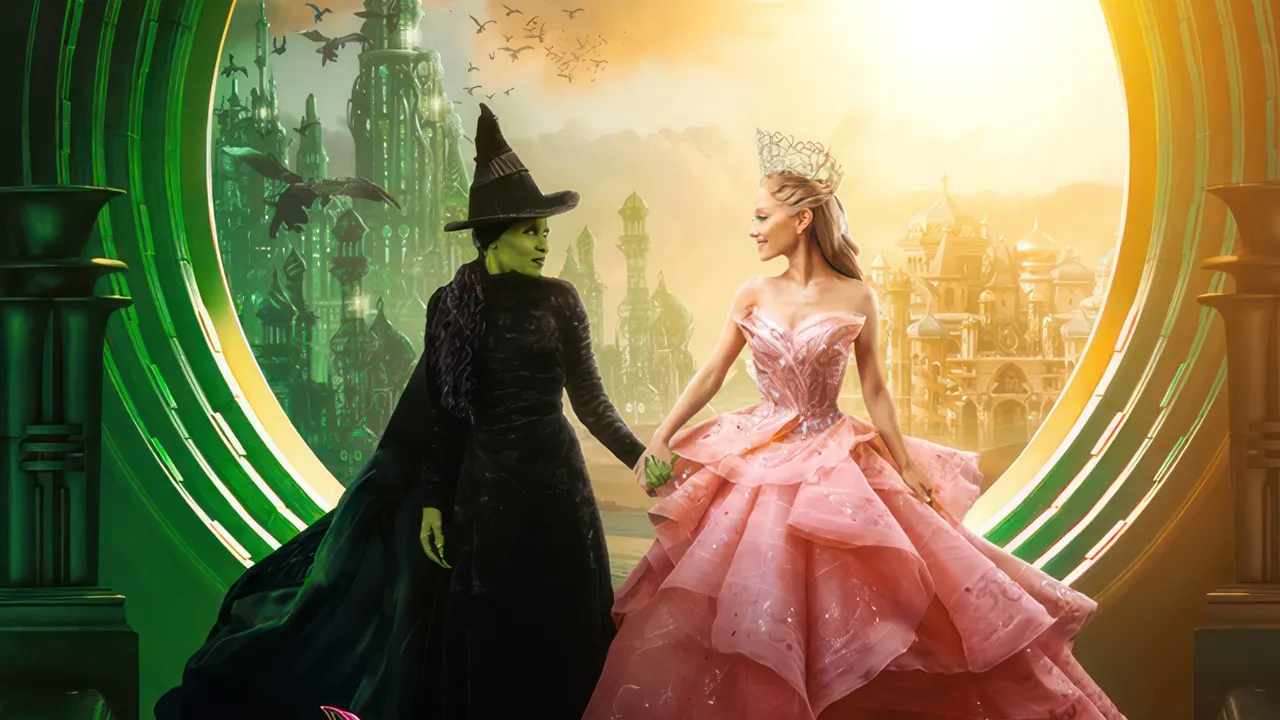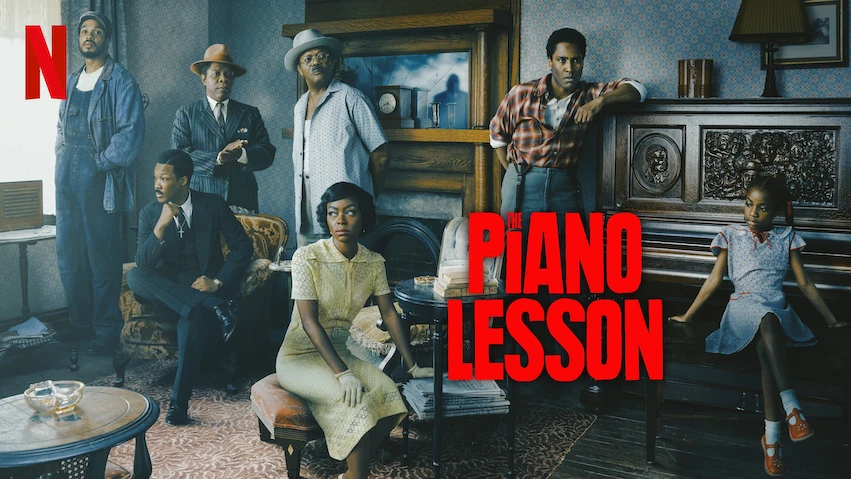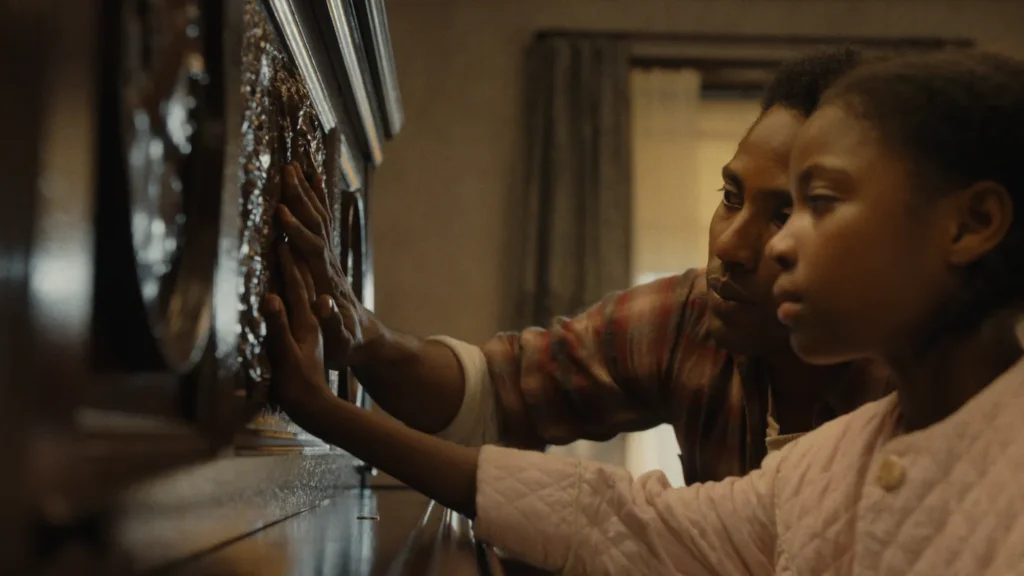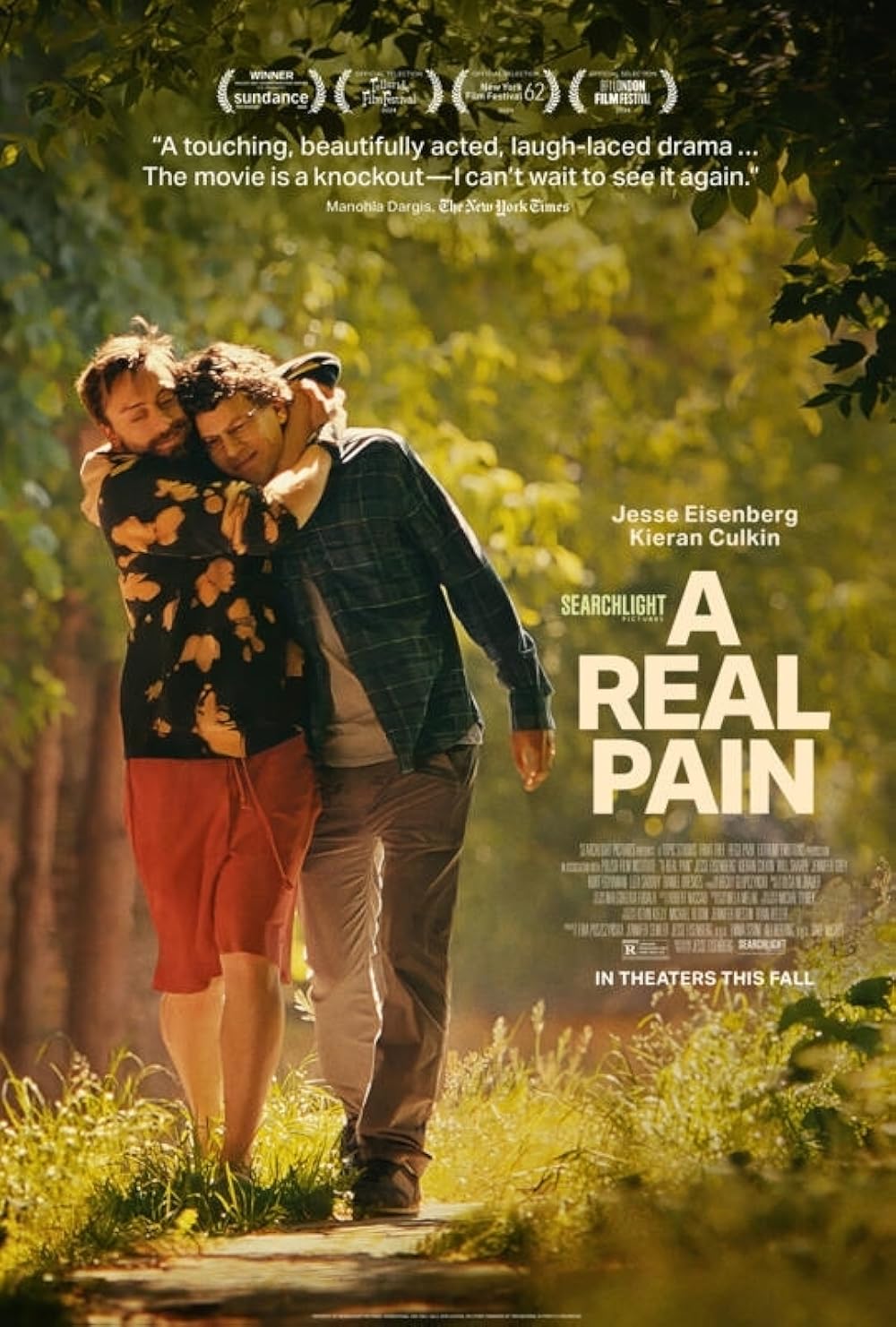Wicked Part 1
Posted on November 21, 2024 at 12:35 pm
B +| Lowest Recommended Age: | Middle School |
| MPAA Rating: | Rated PG for some scary action, brief suggestive material, and thematic material |
| Profanity: | None |
| Alcohol/ Drugs: | None |
| Violence/ Scariness: | Fantasy peril and violence |
| Diversity Issues: | A theme of the movie |
| Date Released to Theaters: | November 22, 2024 |
I feel confident that “Wicked,” this movie musical set in Oz is going to be POP-ular. It is, of course, adapted from the long-running, award-winning Broadway play, which was adapted from the book by Gregory Maguire, which was itself inspired by The Wizard of Oz by L. Frank Baum and the family classic MGM movie it inspired, starring Judy Garland, plus the funkified The Wiz, another musical play and movie. But this is not just some IP brand extension; it is as much an exploration of the nature of good and evil as it is a backstory about some of the world’s most iconic characters. It is also a lot–part one is nearly three hours long, with every minute a cornucopia of visuals, music, dancing, and ideas. Some will be overwhelmed, but many will find it dazzling and worth many repeat viewings.
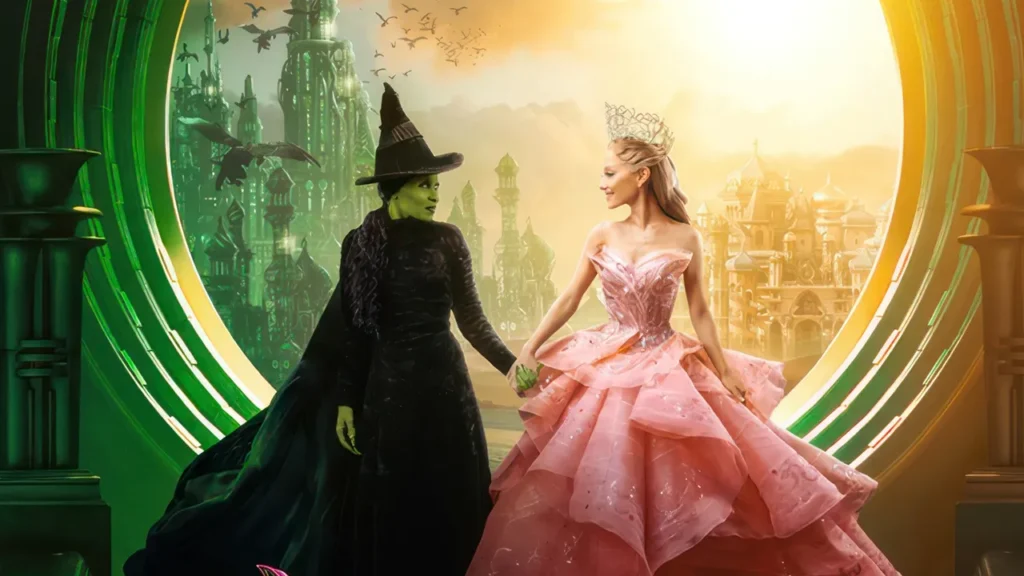
The movie begins with the report that the Wicked Witch of the West has melted due to “a bucket of water thrown by a child.” Glinda the Good Witch arrives via bubble in Munchkin Country to confirm the news. This parallels Judy Garland’s arrival in the MGM film, her tornado-tossed house landing on the Wicked Witch of the East, and then Glinda arrives by bubble to ask Dorothy if she is a good witch or a bad witch. We will glimpse a few other references to the classic film, including a cute animal peeking out of a basket on the back of a bicycle, a shot of the four classic characters, plus Toto, walking through the poppy fields, and the first stop in the Emerald City a makeover musical number in a fantasy beauty salon. We also see the origins of some familiar elements, including the witch’s broom and Glinda’s name. As in the Baum book, the magical slippers are silver, not ruby.
One of the Munchkins asks a questions humans have been pondering since pondering began: Are people born wicked or do they become wicked, and if so, why? That is the theme of this version of the story.
Ariana Grande, appearing under the name on her birth certificate, Ariana Grande-Butera, plays Galinda (yes, that’s her name), a pampered princess who arrives at Oz’s most prestigious institute of higher learning, Shiz University. Think Hogwarts, because though the students are adults, it feels more like a boarding school. It is set in a fabulous compound that feels like a dream project (in both senses of the word) for brilliant production designer Nathan Crowley that is part Victorian, part Edmund Dulac fairy tale, with curves and curlicues everywhere inspired by Art Nouveau, and a sprinkle here and there of steampunk.
Also arriving are two sisters, Elphaba (Cynthia Erivo), with bright green skin, and her sister, Nessarose (played by Marissa Bode, who, like her character, does not have green skin and uses a wheelchair. Galinda is so confident she expects everyone to adore her and is so careless about mistakes that she often uses malapropisms that sort of sound like real words but are not. Elphaba is tentative and shy, but has internal strength of character and a sense of responsibility. She was the result of her late mother’s affair. The only father she has ever known, her mother’s husband, barely acknowledges her, except to order her to take care of Nessarose.
Madame Morrible (Michelle Yeoh) immediately recognizes that Elphaba is gifted with extraordinary magical powers and takes her on for special tutoring. She also decides that the two young women should share a room. At first they dislike and mostly ignore one another, and Galinda pranks Elphaba by giving her an ugly hat to wear to a party. But when the other students laugh at Elphaba, who responds defiantly by dancing by herself, Galinda experiences her first spark of genuine empathy. Instead of claiming to be kind, she shows real kindness by joining Elphaba on the dance floor, and her unquestioned role as the arbiter of status soon has the rest of the crowd joining them in the dance.
Also at the party are Nessarose with Boq (Ethan Slater), who has a crush on Galinda but invited Nessarose because Galinda told him to, and the extremely handsome and charming Prince Fiyero (“Bridgerton’s” Jonathan Bailey). He was a late arrival at Shiz, after being kick out of other schools. At first he seems to be a perfect match for Galinda (she certainly thinks so). They are both gorgeous but superficial and incurious. Then, in the movie’s most significant scene, Fiyero is the only one who helps Elphaba rescue a caged lion cub, and she is the only one who realizes that his constant pursuit of pleasure is not making him happy.
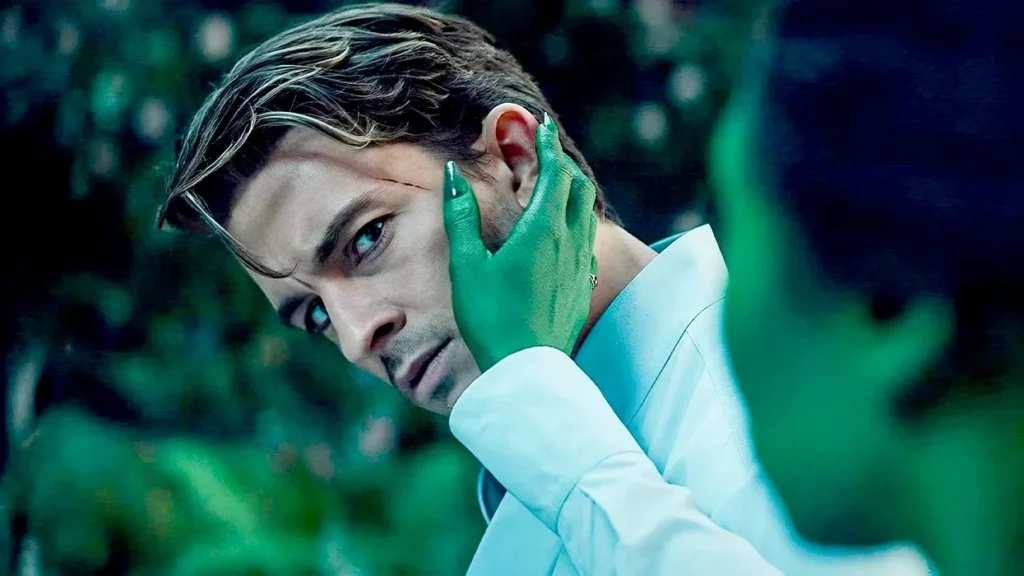
Director Jon M. Chu (“Crazy Rich Asians,”) brings a lot of energy to the movie. Though he does not have the luxury of his “Step Up” and “In the Heights” acting leads’ extensive dance training and skill, the musical numbers, especially the big dance numbers, are creatively and dynamically staged. I especially liked “One Short Day,” as Glinda (she’s changed her name by then) and Elphaba first arrive in the Emerald City. Keep an eye out for the original Broadway Glinda and Elphaba, Kristen Chenoweth and Idina Menzel, in a stage show about Oz history, or rather the Wizard’s preferred version of it.
Bailey has a sinuous charm that conveys Fiyero’s charisma but hints at his feeling lost and struggling with aimlessness beneath the surface. Goldblum’s quirky energy is just right as the Wizard who began as a carny from the midwest. Erivo is the heart of the film, always magnetic and compelling as Elphaba. The bright green makeup does not mask the extraordinary expressiveness of her face, always thoughtful, present, authentic, and grounded, despite the distracting details of the ultra-fantasy world around her. And like Grande, she has a once-to-a generation voice.
The splendor and imagination of the setting and costumes and even the huge musical numbers surround and mostly support real and meaningful questions about bad people doing good things, good people doing bad things, and everyone struggling to find a place somewhere on the continuum between being good and being wicked. Galinda (we learn how she became Glinda) is considered good because she is pretty and smiles a lot. But she is arrogant and selfish. Elphaba is considered if not bad at least weird because she does not smile or conform (note that neither wears the school uniform) but she is devoted to her sister. She is looking for the love she has never received but has no interest in changing anything about herself to try to get it. She knows that would not be real. Other characters surprise us by not being what we expect on the good/wicked scale.
This is a sumptuous and unsubtle treat grounded in Erivo’s graceful and subtle performance. When she defies gravity, she lifts us with her, and we lean forward to the next chapter.
Parents should know that like the MGM movie version, this story features fantasy action and peril with some scary and disturbing images, along with issues of bigotry and cruel treatment. A child is the result of an affair, causing grief and shame.
Family discussion: Why did Elphaba tell Flyero he was not happy? Why did the Wizard want to cage the animals? Are these characters good or wicked or both: Elphaba, Galinda, Madame Morrible? Are any of the characters like someone you know?
If you like this, try: the original Wizard of Oz book and its sequels (great for reading aloud) and the many other versions of the story

